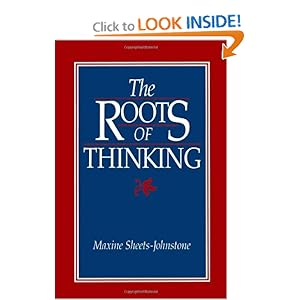This expanded second edition carries forward the initial insights into the biological and existential significances of animation by taking contemporary research findings in cognitive science and philosophy and in neuroscience into critical and constructive account. It first takes affectivity as its focal point, elucidating it within both an enactive and qualitative affective-kinetic dynamic. It follows through with a thoroughgoing interdisciplinary inquiry into movement from three perspectives: mind, brain, and the conceptually reciprocal realities of receptivity and responsivity as set forth in phenomenology and evolutionary biology, respectively. It ends with a substantive afterword on kinesthesia, pointing up the incontrovertible significance of the faculty to cognition and affectivity. Series A
|
| Pulsar en el siguiente: |
|---|
| Acceso a través del servicio E-Libro restringido para usuarios de la UMA THE ROOTS OF THINKING http://www.amazon.com/Roots-Thinking-Maxine-Sheets-Johnstone/dp/0877227691 In this ground-breaking interdisciplinary study about conceptual origins, Maxine Sheets-Johnstone shows that there is an indissoluble bond between hominid thinking and hominid evolution, a bond cemented by the living body. Her thesis is concretely illustrated in eight paleoanthropological case studies ranging from tool-using/tool-making to counting, sexuality, representation, language, death, and cave art. In each case, evidence is brought forward that shows how thinking is modeled on the body-specifically, how concepts are generated by animate form and the tactile-kinesthetic experience. Later chapters critically examine key theoretical and methodological issues posed by the thesis, Sheets-Johnstone demonstrates in detail how and why a corporeal turn in philosophy and the human sciences can yield insights no less extraordinary than those produced by the linguistic turn. In confronting the currently popular doctrine of cultural relativism and the classic Western metaphysical dualism of mind and body, she shows how pan-cultural invariants of human bodily life have been discounted and how the body itself has not been given its due. By a precise exposition of how a full-scale hermeneutics and a genetic phenomenology may be carried out with respect to conceptual origins, she shows how methodological issues are successfully resolved. Author note: Maxine Sheets-Johnstone is an independent scholar and Courtesy Professor of Philosophy at the University of Oregon.  This interdisciplinary work demonstrates, by steadfast attention to corporeal matters of fact, how the concept of power and of power relations is rooted in bodily life, in animate form. It first shows how Foucault's "optics of power" is Sartre's "The Look" writ large, and proceeds to explain how optics of power are undergirded by a "power of optics" which has its roots in our primate evolutionary heritage. The exploration of an evolutionary genealogy leads in turn into extended examinations and exemplifications of corporeal and intercorporeal archetypes. Moving easily through biological, anthropological and psychological domains, and informed by keen philosophical reflection, "The Roots of Power" aims to show how the personal and political are fundamentally joined in the body, that is, how the political defines us both as creatures of a natural history and as culturally - and individually - groomed bearers of meaning. Sheets-Johnstone assesses the complex of topics that progressively surfaces such as females' being receptive "year-round", male threat/female vulnerability, Sartre's characterisation of females' being "in the form of a hole", and proposed relationships between aggression and sex. In addition, she shows through detailed analyses of Derrida's absencing of the living body from the scene of grammatology, and of sociobiologists' explanations of rape as adaptive behaviour how the tenets of postmodernism and sociobiology preclude insight into the personal-political equation. "The Roots of Power" concludes with an extended critical meditation on Lacan's psychoanalytic, showing not only how it is rooted in idiosyncratic archetypal elaborations but how, in its scientisation of life, pedestalling of human language, and silencing of the living body, it is a microcosm of 20th-century Western practices and ideologies. |
No hay comentarios:
Publicar un comentario
yesyukan